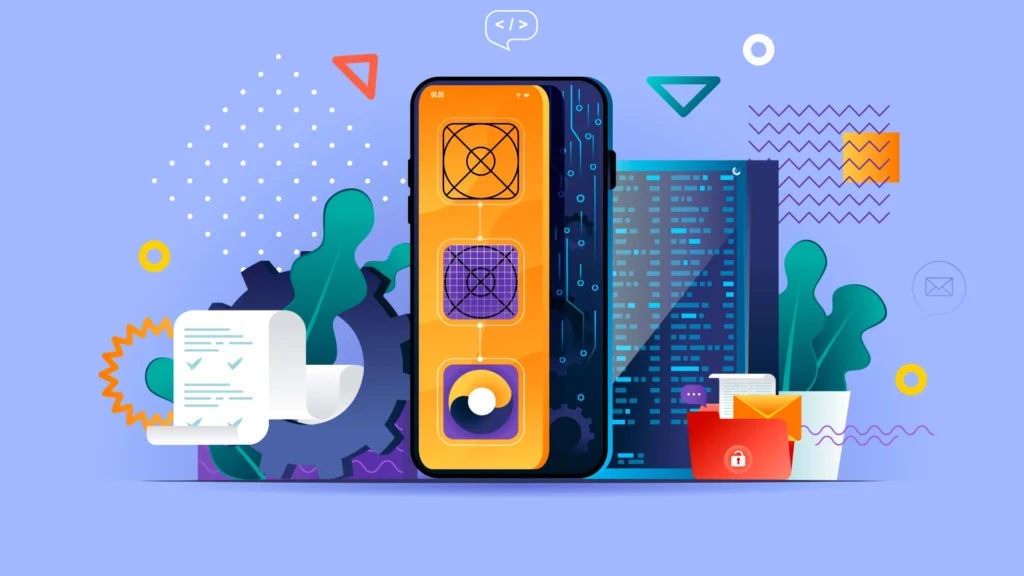Description
These days, mobile apps are part of our lives; they run businesses, give people time to spare between events, and entertain at leisure. But they are still growing alongside technology, and the mobile developer industry is expanding tremendously. The relevance of choosing the correct mobile app framework in 2025 holds good at this time as compared to any other for competitive readability in market scenarios. The best in trend and framework selection is all from this blog to framework selection and the latest trends.
Choosing the Right Mobile App Framework
The first action in creating a successful application is choosing the right mobile app framework. It can dramatically impact your app’s performance, scalability, and user experience. Here are some of the major considerations:
- Platform Support: Understand whether you will need an iOS, Android, or cross-platform framework. Cross-platform apps are usually time and money-saving.
- Developer Friendliness: The simpler it is to learn and the more documentation it has, the faster the development will go.
- Community and Ecosystem: Larger and more active communities give you better support, plugins, and libraries.
- Performance: Look for the framework that allows building high-performing applications that are interactive.
- Scalability: Will the framework allow scaling so that it can grow with your user base?
The Growth of Mobile App Development
The boom in the mobile application industry appears distinct from the increasing number of people using smartphones. Another contributing factor is the availability of internet connections. Here are some figures that statically show its importance:
- Worldwide Revenue: It is predicted that mobile applications will outplay the current revenue level of $935 billion in 2025 from $693 billion in 2021.
- User Engagement: Users spend approximately 4.8 hours on a variety of mobile applications on average each day, ever-increasing.
- Enterprise Adoption: More than 85 percent of the firms are deploying mobile apps as a central portion of their digital strategy.
- App Store Events: Every day, millions of apps are downloaded from various app stores around the world, marking the rather evident demand and possibilities.
Key Factors for Success in Mobile App Development
- User Experience (UX): Desiring an intuitive feel of the interface and very appealing aesthetics is required to keep users interested.
- Performance Optimization: Make sure fast loads and not many crashes to enhance the experience.
- Security: Strong encryption and authentication mechanisms would protect user data.
- Continuous Updates: Keep introducing new features and improvements to ensure that users are interested in returning.
- Cross-Platform Compatibility: Therefore, apps should work seamlessly across platforms to reach as many users as possible.
Top Mobile App Development Frameworks in 2025
Flutter
Developed by Google, Flutter App Development empowers developers to create natively compiled applications for mobile, web, and desktop from a single codebase.
- Hot-reload for real-time updates.
- A rich library of customizable widgets.
- Exceptional performance with native-like experiences.
Example: Alibaba: The e-commerce giant Alibaba uses Flutter for its mobile app to deliver a highly responsive and visually appealing experience across multiple platforms. The app ensures seamless interactions for millions of users worldwide.
React Native
Backed by Meta (formerly Facebook), React Native allows the development of apps for Android and iOS using JavaScript and React.
- Reusable components for faster development.
- A vibrant developer community.
- Easy integration with third-party plugins.
Example: Instagram, the popular social media app, relies on React Native for parts of its mobile app, enabling a faster development cycle and offering a consistent user experience across Android and iOS platforms.
SwiftUI
Apple’s declarative framework simplifies iOS app development, allowing for the creation of intuitive and visually appealing user interfaces.
- Simplified declarative syntax.
- Automatic integration with Apple’s ecosystem.
- Real-time design previews.
Example: Apple’s Support Portal: SwiftUI enhances the design and functionality, offering users a polished interface for troubleshooting and support.
Kotlin Multiplatform
Designed for modern Android development, Kotlin Multiplatform also supports cross-platform app development.
- Seamless integration with Java and Android tools.
- Reduces duplication of code across platforms.
- Excellent tooling support.
Example: Trello uses Kotlin Multiplatform to share code across both iOS and Android, allowing the app to deliver a consistent task management experience for users on both platforms, with robust performance and easy synchronization.
Ionic
Built on web technologies like HTML, CSS, and JavaScript, Ionic combines the ease of web development with the power of a native mobile experience.
- Wide support for third-party plugins.
- Strong developer community.
- Easy testing and debugging tools.
Example: Pacifica, a mental health app, uses Ionic to create a cross-platform experience for users to track their moods, access mindfulness tools, and manage anxiety and stress, ensuring easy access on both mobile and desktop.
Mobile App Development Future Trends
- AI and ML: AI-powered apps offer personalized experiences, predictive analytics, and smart features by integrating key industry players.
- 5G Technology: The 5G rollout would change what apps can do, creating possible 3D experiences and high-end gaming applications with real-time features.
- Smart Integration: With the rise of wearable devices, apps for smartwatches and IoT devices will become increasingly common.
- AR and VR: AR and Virtual Reality will be used beyond gaming to provide an enriched experience in education, commerce.
- Low-code, No-Code Platforms: This will allow a common layman or an ordinary person to create an effective and operational app just by himself. Thus, App-making would become democratized.
Conclusion
Mobile app development will wholly throng with excitement in the year 2025, which has an opportunity for mobile app development. With the best framework, in tune with the trends, and focusing on the people, mobile applications will be able to cater to the needs of the users for the success of the companies. This can be provided using frameworks such as Flutter, React Native, and SwiftUI that offer a great way for efficiency, scalability, and innovation in mobile solutions. As the industry grows, embracing those tools and trends will enable your app to shine in the competitive marketplace.
Flutter: The Emerging Future of Mobile Applications
Flutter has consistently rewritten the complete story every time it has been launched. The new conceptualization and unmatched ability to make apps have certainly cleared the doubt for such a platform for developers. It’s simply for an application to develop high-performing, visually beautiful, and engaging applications for multiple cross-platform devices. For instance, “Google Pay” balances the application with the user experience across a variety of devices. Keeping in mind its always-increasing community and renewed by Google, Flutter makes sure businesses get speedier times to market and lower costs, with a wonderful experience by the user-the true formula for success in a world of constantly changing mobile applications.



